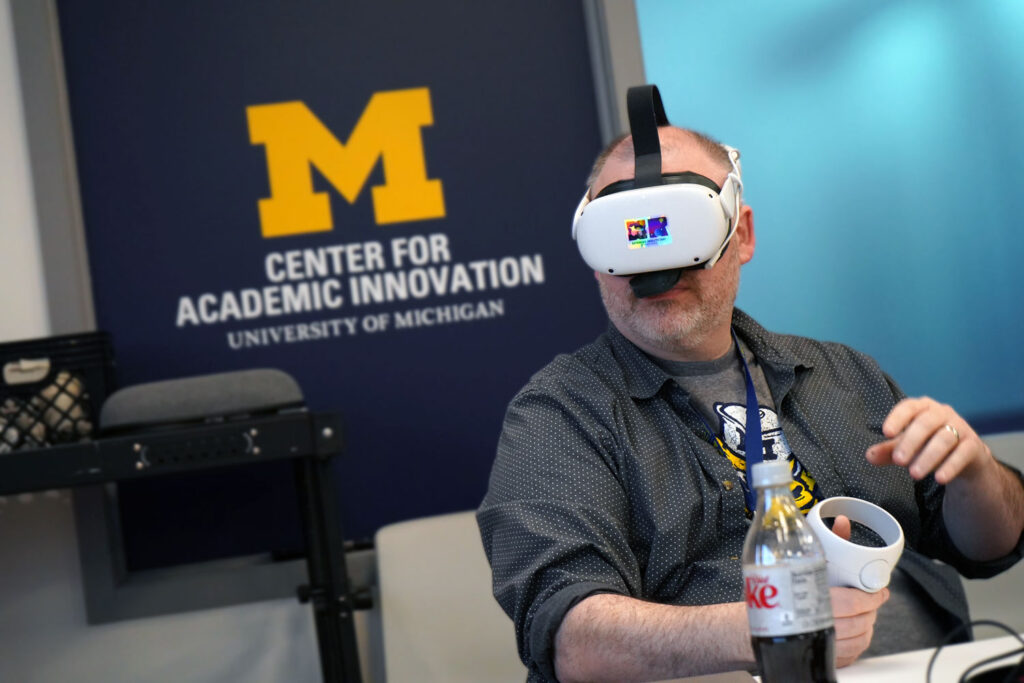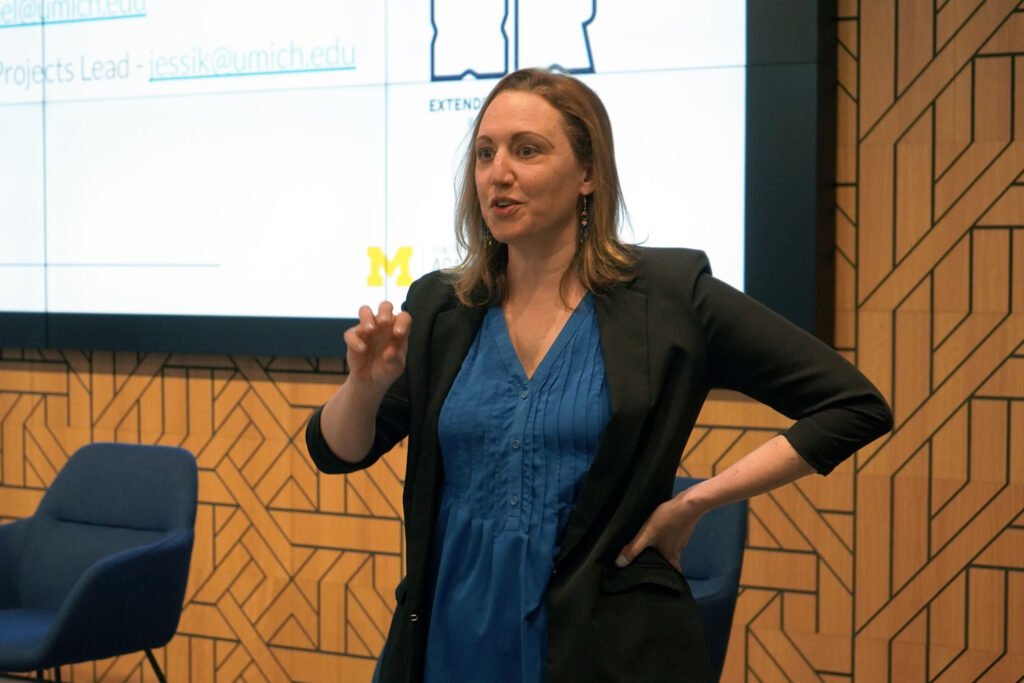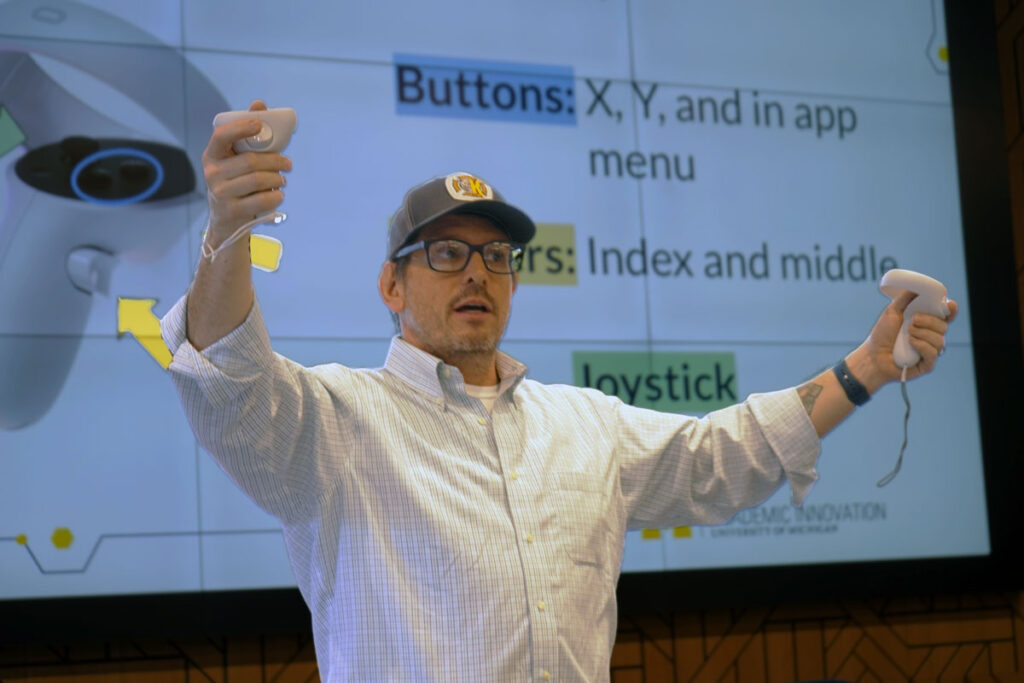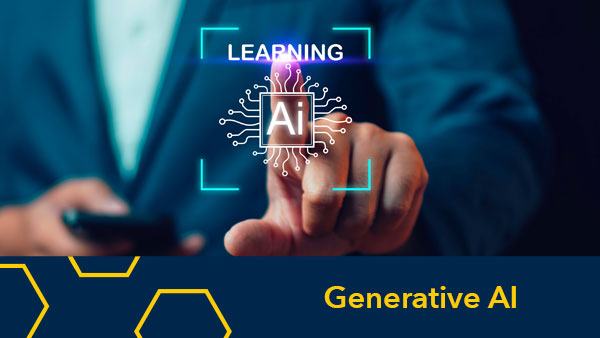
XR training simulation trains staff in important behavioral-based interviewing skills on campus with thousands of job openings a year
Sean Corp, Communications Lead
The University of Michigan’s Ann Arbor campus has more than 22,000 employees, and thousands of job openings crop up every year as people leave for new opportunities, retire, or new positions are created. Recruiting and hiring candidates is one of the most important decisions many people who work at the university make every year. However, there is little formal interview training to help those leading a job search or participating in an interview committee.
Angela Benke, director of talent acquisition within University Human Resources, specializes in those skills. However, the nine-person team at Talent Acquisition cannot train the thousands of hiring managers on campus.
Benke set out to find a way to increase opportunities for hiring teams to take specialized training in interviewing skills while maintaining high quality and delivering at scale. She was eager to explore the potential of a workshop utilizing virtual reality. The only problem was that she didn’t know how to design, build, and run a virtual reality training option. However, she knew the Center for Academic Innovation was home to the XR Initiative, which was working on funding and supporting virtual reality projects.
XR Offers a New Way to Learn and Practice
She met with Jeremy Nelson, the center’s senior director of XR, media design, and production, in 2020, and they decided to work together on a solution. The subsequent four-year partnership included a pandemic pause, a 2022 pilot study, a formal RFP and agreement in 2023, and plenty of design, testing, and iteration. By April, Benke had nearly completed her first 10 sessions of HR training in behavioral-based interviewing skills that put around 100 participants in a virtual reality interview session, complete with a virtual job candidate and interview coach who offers guidance after you select potential questions.
“Before I came to U-M, my organization (a business consulting firm) made sure every hiring manager took a two-day boot camp to learn about behavioral interviewing. It included theory, practice, and coaching,” Benke said between sessions of her HR training held at the center’s office.
“That’s just not possible at a large university, so I asked myself how to replicate part of that experience. I decided VR made sense because practice is so much more effective than only listening to theory, and VR is also less awkward. We are not asking people to pretend to be job candidates. We are asking people to practice their interviewing skills. VR also ensured high quality because I could design a consistent experience for everyone.”
While conceiving the project, Nelson recommended they explore several options, including STRIVR, Talespin, and Motiv.io. After testing and the pilot, they agreed on a contract with Talespin, a VR training vendor that offers both out-of-the-box training experiences on its platform and the ability to custom-build experiences.
This allowed the center to help Benke achieve her goal by custom-building a new training experience while giving center staff time to better understand VR training platforms and explore other ways to use them in teaching and learning.
“Our typical XR projects are focused on student learning opportunities. This was a unique opportunity to incorporate soft-skills training and create an environment to practice important job skills,” said Nelson.
“The benefit for U-M staff who take this training is immense. I also view it as a first step in better understanding how XR simulations can help students practice real-world scenarios and help them prepare for future academic and professional careers.”

Finding the Best Candidate for the Job
Benke wrote the simulation script and further refined the experience with the help of learning experience designers and XR Student Fellows at the center, who helped her identify her learning goals, interactions and functionality, and optimal length for each part of the virtual experience.
“It is common to see hiring committees focus on technical and functional skills when considering candidates for a role, but there are other critical components to finding success in many roles. Excelling in a position also requires behavioral and motivational skills. Behavioral-based questions are good at surfacing these skills in candidates, and without them, you are working off of incomplete information,” Benke said.
It is also a step toward providing a foundation of consistent assessment that aligns with our values of inclusivity and objective hiring practices.
“When you are well-trained as a hiring manager, you feel more confident in your ability to make a decision. You feel prepared, the candidates feel more valued and supported through the process, and, most importantly, the skills you are assessments are directly aligned with the needs of the role,” Benke said. “That leads to a well-informed decision because you have a better sense of someone’s holistic set of skills and how they will be able to succeed in a role.”

High-Risk Training in a Low-Risk Setting
Benke has an agreement with Talespin for 400 licenses split between Talent Acquisition and Organizational Learning over the next two years to provide behavioral-based interviewing and other training sessions. Each session includes access to a Meta Quest 2 headset and a tutorial from Ryan Koepp, an XR Student Fellow. For many, it is the first time using a VR headset and participating in a virtual experience.
Koepp and Benke have fine-tuned the process to ensure the onboarding into the technology is as short as possible, and the maximum amount of time can be spent on BBI training rather than XR troubleshooting.
It’s an experience Koepp takes a lot of pride in. He joined the center as a student fellow in his 40s after a career as a firefighter. He had a particular interest in simulation training for his firefighting peers and took that interest into a second career focused on XR as a teaching and learning tool.
“Simulation training is great because it introduces the opportunity to have a low-risk experience to practice high-risk scenarios,” Koepp said.
While interviewing techniques might not seem akin to battling a blaze, they are high-risk because the process is so essential to the operations of the university, and the consequences of picking the wrong candidate can be impactful. “The stakes are high, and this experience helps you learn and helps you improve,” Koepp said.
Benke said the response from those who have undergone the training has been overwhelmingly positive.
“It’s nice when people tell you that what you helped create is cool and innovative. It’s a perfect delivery vehicle for this type of training,” Benke said. “What I love, and what tells me we hit the mark, is that when people are done, they ask the exact kind of next-level questions. They are asking the kinds of questions you ask when you have increased your skills and better understand what behavioral-based interviewing is all about.”


